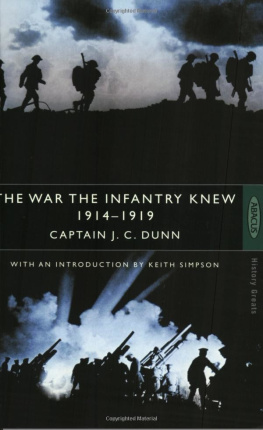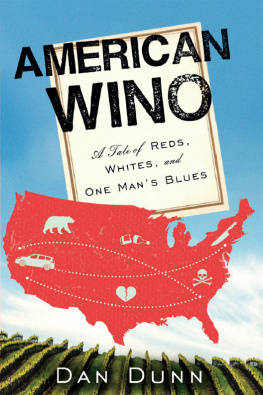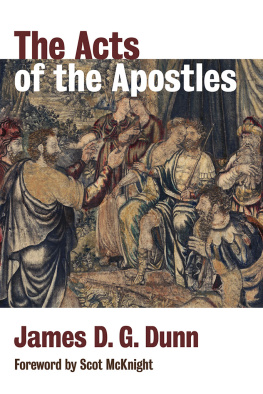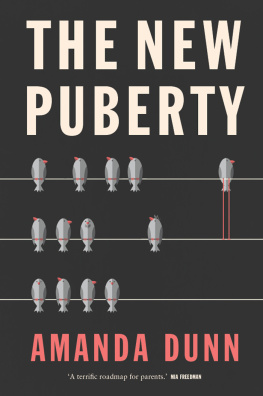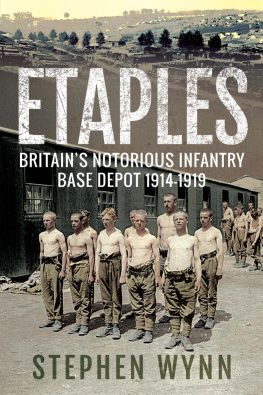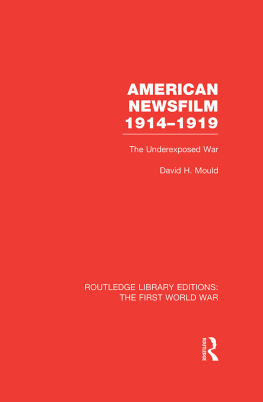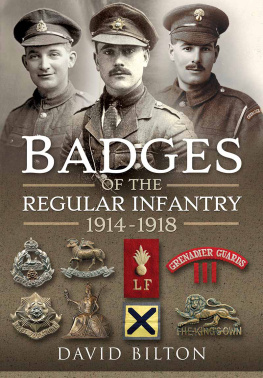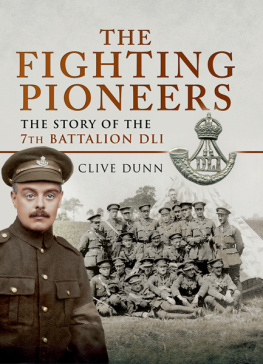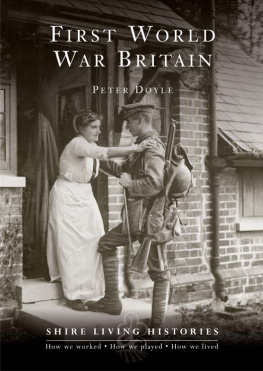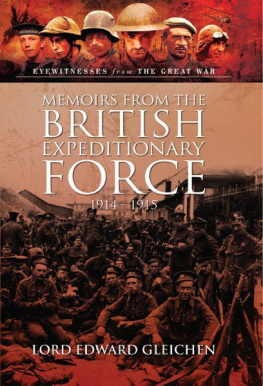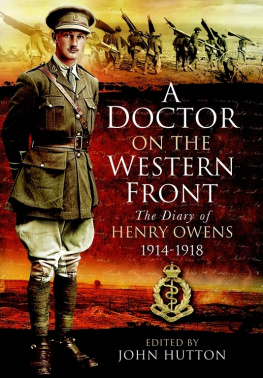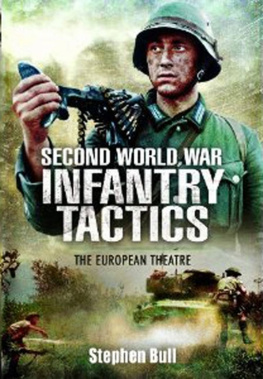The War the Infantry Knew 1914-1919
Captain J. C. Dunn
Captain J. C. Dunn D.S.O., M.C. and Bar, D.C.M. was Medical Officer of the Second Battalion His Majestys Twenty-Third Foot, The Royal Welch Fusiliers. A courageous soldier and an impressive man, he was mentioned by both Robert Graves and Siegfried Sassoon in their famous books with respect and admiration. Compiling The War the Infantry Knew 1914 1919 was a labour of love and Captain Dunn did not name himself as the editor. He died in 1955.
Keith Simpson was a Senior Lecturer in War Studies and International Affairs at the Royal Military Academy Sandhurst from 1973-1986. He is the author of two books on the British Army and the First World War and has written a history of the German Army. He is now a defence consultant. Keith Simpson is married and lives at Little Sandhurst.
A Chronicle of Service in France and Belgium
with
The Second Battalion His Majestys Twenty-Third Foot, The Royal Welch Fusiliers: founded on personal records, recollections and reflections, assembled, edited and partly written
by
One of their Medical Officers.
Published by the Penguin Group 27 Wrights Lane, London W8 5TZ, England Viking Penguin Inc., 40 West 23rd Street, New York, New York 10010, USA Penguin Books Australia Ltd, Ringwood, Victoria, Australia Penguin Books Canada Ltd, 2801 John Street, Markham, Ontario, Canada L3R IB4 Penguin Books (NZ) Ltd, 182 190 Wairau Road, Auckland 10, New Zealand
Penguin Books Ltd, Registered Offices: Harmondsworth, Middlesex, England
First published in Great Britain by P. S. King Ltd 1938 in a private edition
This edition first published in Great Britain by Janes Publishing Company Limited 1987 Published in Cardinal by Sphere Books Ltd 1989 13579 10 8642
Text copyright The Royal Welch Fusiliers 1987 Introduction Keith Simpson 1987
Made and printed in Great Britain by Richard Clay Ltd, Bungay, Suffolk
Except in the United States of America, this book is sold subject to the condition that it shall not, by way of trade or otherwise, be lent, re-sold, hired out, or otherwise circulated without the publishers prior consent in any form of binding or cover other than that in which it is published and without a similar condition including this condition being imposed on the subsequent purchaser
Photograph Acknowledgements
Photographs 1, 2, 3, 4, 5, 6, 7, 8, 9, 10, 11, 12, 14, 15, 19, 23, 25 and 31 are by courtesy of the Royal Welch Fusiliers. Photographs 13, 16, 17, 18, 20, 21, 22, 24, 26, 27, 28, 29 and 30 are by kind permission of the Trustees of the Imperial War Museum, London.
PREFACE
War will always interest men.
There is no end to the output of books about the Great War. Setting aside technical books, most of them have come from writers whose emotions have been quickened by the penitential mood that follows all great wars, or from writers turning to account that mood and the relaxation of age-long, wholesome usages needful to community life, which is another common sequel of great popular upheavals. A picture of the War from the front-line standpoint, made without afterthought, will neither tickle a taste for foulness nor slake a thirst for pomp if it is drawn from what was seen and felt, and noted, at the time. War in the battle-zone between antagonists of equal tenacity and resource is prolonged drudgery that is what many people say about life in general but drudgery with fearful moments; and, as in everyday life, there is very much that is trivial, or seems so. War is neither a glitter of high lights nor a slough of baseness, it calls forth the best that is in the human spirit: its worst aspects are found far from the battle-line.
This Chronicle is offered as an authentic record of the comings and goings, the chances, deeds and moods of the Second Battalion of His Majestys 23rd Foot, the Royal Welch Fusiliers; it tells of blissful and what were counted hum-drum days as well as of fevered hours and minutes. To begin with it was an abstract of day-to-day notes made during the long middle period of the War; two narratives from diaries of the early weeks were the first additions, then a collection of still clear memories was wrought in, and an outline of the last phase was joined on. Yielding to the wish of a few interested correspondents I set myself the task of welding the parts in narrative form and of finding witnesses to fill serious gaps. Contributions, long and short, have come from some fifty sources in the course of years. The bulk of the story consists of notes which, though expanded later, were made within twenty-four hours, at most, of the events described; contemporary letters, operation orders, messages, and Battalion Intelligence maps which have escaped destruction have been drawn upon. Someone with first-hand knowledge has given the detail of each incident or phase, or has added to it, and readers with equal knowledge may have checked it. A sentence may be a compound of three sources. Plain has been preferred to coloured in the telling of incident. Guess-work has not been taken. Vagueness or omission is not owing to want of candour, but to want of evidence: distance has made it difficult to trace or tap likely witnesses; many men will talk, and talk vividly, but not write. The ambit of anyones observation is limited, especially during action. At all times food and warmth occupy much of the front-line mans thoughts indeed, the private soldiers thoughts, as one of them wrote, are largely bounded by these needs; and when things are moving his load or peril engrosses him. Impressions of happenings are consequently blurred, they become mingled, and are soon lost by the great majority of men. The facts about which witnesses have written or spoken are stated on their authority, but quotation marks have been used sparingly because the original text is seldom given in its verbal integrity, although the idiom of most sources is in great part original and the tone altogether so. The brevity, inconstant tense, and disjointedness of diaries have not been quite expunged.
The actions and locations of other units are sketched sufficiently to introduce the action of the Battalion which followed, or as part of its coincident action; but, since it is seldom easy to learn what other units really did, the sketches are not always to be taken as conclusive: even within a unit a carried story may take on a twist.
Events are dealt with at greatly varying length, chiefly owing to a relatively unequal supply of data. Tactical importance and length of treatment have no relation here. In war incidents and events may signify much to a battalion, and be of no account in the operations of an army: sometimes a few men do a great thing unwittingly. A sense of proportion can be had only by comparison with large-scale accounts; such a comparison is beyond the intended scope of these personal impressions and reflections. Nowhere has the story been adjusted to any official view; it remains throughout a series of records of individual observation and, in the main, of common outlook and talk in billet and trench. The views are mostly repetitions of casual talks, of gossip during reliefs and at other times when news was exchanged; they reflect front-line knowledge and attitude, and express its mood. As a consequence lower and higher staffs may object to various statements, to some of which there is necessarily another side. Divergences from official reports may be found in several passages. Recorded history, which is mostly of official origin, is not always a recital of what happened there are many reasons for that.
My service of nearly three years with the Battalion, or in its Brigade, was a time of trench warfare with eruptions of great violence, of waning morale, of increasing vexation and heartache. This is largely a record of a long spell of duty done in the face of difficulty and discouragement which, perhaps, demanded more leading and gallantry than actions of which more has been heard, more made. The Battalion was always used late in action. Attacks had to be made with the knowledge of others failures, and over their dead. Such a lot called for a full measure of steadfastness and devotion, and yielded no redeeming spectacular repute. What was achieved is made radiant in my memory by the gay self-sacrifice of junior officers and of non-commissioned officers; by the resource and cheerfulness in discomfort of the men of our Old Army, and their prompt answer to every call, confident in themselves and in each other: beside them the Territorial and New Army personnel had the native virtues common to all, good nature and endurance.
Next page
